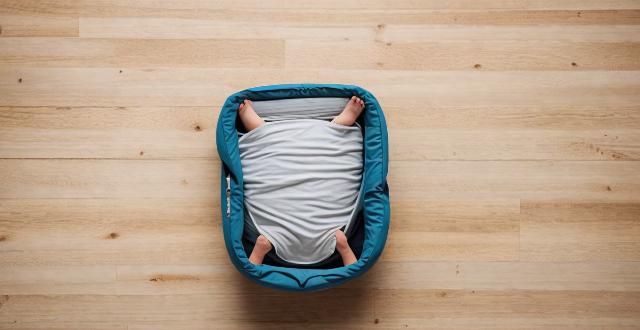Sleep Bedtime

How important is bedtime routine for improving sleep ?
The article discusses the importance of having a bedtime routine for improving sleep. It explains how a bedtime routine can help regulate the body's internal clock, reduce stress and anxiety, promote better sleep quality, and improve mental health. The article also provides steps for creating a bedtime routine, including setting a consistent bedtime, choosing relaxing activities, creating a comfortable sleep environment, and sticking to the routine consistently.

Can exercising too close to bedtime interfere with sleep ?
Exercising too close to bedtime can interfere with sleep due to factors like increased heart rate, elevated body temperature, release of stimulating hormones, activation of the nervous system, muscle soreness, and digestive activity. To avoid sleep interference, it's recommended to finish workouts at least 3 hours before bedtime, choose lighter exercises closer to bedtime, create a calming pre-sleep routine, and be mindful of post-exercise nutrition.

How can I improve my sleep quality ?
Improving sleep quality involves establishing a bedtime routine, creating a comfortable sleep environment, limiting caffeine and alcohol intake, avoiding electronics before bed, exercising regularly, managing stress levels, and considering natural sleep aids.

How do electronic devices impact our ability to fall asleep ?
Electronic devices, such as smartphones and laptops, have become an integral part of modern life but their use has raised concerns about their impact on sleep quality and quantity. Exposure to blue light from electronic screens before bedtime can delay the onset of sleep by suppressing the production of melatonin, a hormone responsible for regulating sleep-wake cycles. This means that using electronic devices in the hours leading up to bedtime can make it harder for us to fall asleep. In addition, engaging with stimulating content on electronic devices can lead to mental arousal, making it difficult for us to relax and fall asleep. To reduce the impact of electronic devices on sleep, consider implementing tips such as establishing a relaxing bedtime routine, limiting screen time before bed, creating a technology-free sleep environment, and engaging in mindfulness practices.

What role does stress play in sleep disturbances and how can it be managed ?
Stress can significantly impact sleep quality by causing difficulty falling asleep, frequent awakenings, light sleep, and early morning awakenings. Managing stress through relaxation techniques, regular exercise, healthy eating habits, a consistent bedtime routine, a comfortable sleep environment, limited screen time, and seeking professional help when needed can improve sleep quality and overall well-being.

How does shift work impact sleep patterns, and what can be done about it ?
Shift work can significantly disrupt sleep patterns due to conflicts with the natural circadian rhythm. Strategies for managing sleep disruptions include maintaining a consistent sleep schedule, creating a sleep-friendly environment, avoiding stimulants before bedtime, getting adequate exercise, and seeking professional help if needed.

Is there a specific diet that can help with better sleep ?
Diet plays a crucial role in sleep patterns, with certain foods promoting relaxation and others disrupting sleep. The best foods for better sleep include turkey, milk, bananas, almonds, and chamomile tea, while caffeine, alcohol, spicy foods, sugary snacks, and heavy meals should be avoided before bedtime. Incorporating these dietary changes can help improve the quality of sleep and overall well-being.

What strategies can help children develop good sleep habits ?
This article discusses strategies to help children develop good sleep habits, including establishing a consistent bedtime routine, creating a comfortable sleep environment, limiting screen time before bed, encouraging physical activity during the day, and maintaining a healthy diet. These habits are crucial for children's growth and development, leading to better physical health, improved cognitive function, and emotional stability. Parents should be patient and persistent in implementing these strategies, as it may take time for them to become established.

Can excessive exercise lead to sleep disorders ?
Overtraining can cause sleep disorders by disrupting normal sleep patterns and causing physical stress and fatigue. Relaxation techniques such as meditation, yoga, or deep breathing exercises can help calm your mind and body before bed. Adjusting your exercise routine and creating a consistent sleep schedule can also improve sleep quality. If you continue to experience sleep disturbances, consult with a healthcare professional for further evaluation and treatment.

What role does sleep play in exam preparation ?
The text discusses the crucial role of sleep in exam preparation, emphasizing its impact on cognitive functioning, memory consolidation, and emotional regulation. It outlines various benefits of adequate sleep, such as improved concentration, decision-making skills, learning capacity, and memory retention. Additionally, it highlights the importance of reducing anxiety, increasing motivation, and improving mood during the exam preparation process. The text also provides tips for achieving optimal sleep, including establishing a consistent sleep schedule, creating a comfortable sleep environment, limiting caffeine and nicotine intake, relaxing before bedtime, avoiding heavy meals late at night, limiting daytime naps, exercising regularly, and managing stress levels. Overall, the text underscores the significance of prioritizing sleep as an essential component of exam preparation for enhanced performance and well-being.

How does sleep deprivation affect muscle recovery after workouts ?
Sleep is crucial for muscle recovery after workouts, as it allows the body to repair and rebuild damaged muscle tissue. Sleep deprivation reduces growth hormone production and protein synthesis, leading to inefficient muscle recovery. Strategies for improving sleep quality include establishing a consistent sleep schedule, creating a relaxing bedtime routine, avoiding screens before bed, getting plenty of exercise, and creating a comfortable sleeping environment. By prioritizing sleep, you can improve muscle recovery and overall health.

Is there a connection between caffeine intake and sleep difficulties ?
The article discusses the connection between caffeine intake and sleep difficulties, highlighting factors such as individual sensitivity, timing of consumption, and the amount consumed. It explains how caffeine works in the body to increase alertness and reduces feelings of fatigue by blocking adenosine receptors. The article also outlines the effects of caffeine on sleep, including difficulty falling asleep, reduced deep sleep, frequent awakenings, and shortened REM sleep. To manage caffeine intake for better sleep, the article suggests limiting caffeine intake, avoiding late-day consumption, creating a bedtime routine, and monitoring personal response to caffeine.

How does exercise affect sleep patterns and quality ?
Exercise significantly influences sleep patterns and quality. Immediate effects include increased alertness and better body temperature regulation for sleep. Long-term, regular exercise improves sleep quality and regulates sleep patterns. Different types of exercise—aerobic, anaerobic, and mindful movements like yoga—all positively affect sleep but may require varying recovery times. The timing of exercise is crucial; morning workouts set the day's tone with minimal sleep interference, while late-night exercises can hinder sleep preparation. Tailoring workout routines to individual needs optimizes rest and overall well-being.

Are there any natural remedies to improve sleep ?
This article discusses natural remedies that can help improve sleep, such as chamomile tea, lavender oil, valerian root, magnesium, exercise, meditation and yoga, and maintaining a consistent sleep schedule. These remedies can promote relaxation, reduce anxiety, regulate the body's internal clock, and improve the quality of sleep. Incorporating these remedies into your daily routine can help you enjoy the benefits of feeling well-rested.

Are there any particular exercises or stretches that promote better sleep ?
**Exercises and Stretches for Better Sleep** Sleep is crucial for overall health, and poor sleep can lead to various issues. Specific exercises and stretches can improve sleep quality. These include yoga poses like Child's Pose and Legs Up the Wall, meditation techniques such as Body Scan and Guided Meditation, gentle aerobic exercises like walking and swimming, stretching exercises including neck stretches and shoulder shrugs, and deep breathing exercises like the 4-7-8 technique and diaphragmatic breathing. Incorporating these into your routine can significantly improve your sleep quality.

What is the best time to exercise for better sleep ?
This article discusses the best time to exercise for better sleep. Regular physical activity is known to improve sleep quality, but the timing of your workout can significantly impact how well you rest at night. The ideal time to exercise is in the morning or early afternoon, as these times allow for ample cooling down and winding down periods before bed. However, individual preferences may vary, and consistency is key; finding a time that works for you and sticking to it will have the most significant impact on your sleep.

How does an active lifestyle affect sleep quality ?
The text discusses how an active lifestyle can positively affect sleep quality. It outlines the benefits of physical activity for sleep, such as improved sleep onset, increased deep sleep, reduced sleep disturbances, enhanced REM sleep, and better sleep efficiency. The mechanisms underlying this relationship are also explored, including thermoregulation, stress reduction, neurotransmitter regulation, circadian rhythm alignment, and muscle relaxation. Practical tips for incorporating physical activity into one's routine are provided, such as choosing appropriate activities, establishing a routine, avoiding late-night workouts, being mindful of intensity, and incorporating relaxation techniques. Overall, the text emphasizes the importance of regular exercise for improving sleep quality and suggests ways to optimize its benefits.

How long should I nap during the day without affecting night-time sleep ?
Daytime naps can be advantageous for boosting energy and productivity, but it is essential to consider their duration to avoid impacting night-time sleep. The ideal lengths of daytime naps are the 20-30 minute power nap and the 90-minute recovery nap. It is crucial to avoid oversleeping during the day, which can lead to difficulty falling asleep at night. To make the most out of your nap time, find a quiet and comfortable place, limit caffeine intake, create a relaxing environment, set an alarm, be consistent, avoid napping too close to bedtime, and listen to your body. By following these tips, you can enjoy the benefits of daytime naps while still getting a good night's sleep.

How important is rest and sleep in sports recovery ?
Rest and sleep are crucial components of an athlete's recovery regimen, essential for muscle repair, CNS recharge, and mental clarity. Quality and quantity of sleep directly impact athletic performance through deep sleep phases and REM sleep. Practical tips include creating an optimal sleep environment, developing pre-sleep routines, and maintaining proper nutrition and hydration. Prioritizing rest and sleep is key to achieving peak physical condition and driving overall athletic success.

How much exercise is needed to improve sleep ?
The text discusses the importance of regular physical activity in improving sleep quality. It highlights how exercise can lead to better sleep patterns, faster sleep onset, deeper sleep, and improved sleep efficiency. The amount of exercise needed varies depending on individual factors, but general guidelines suggest at least 150 minutes of moderate-intensity aerobic exercise per week. Even small amounts of physical activity can have positive effects on sleep. Various types of exercise, including aerobic exercises, resistance training, yoga, and Pilates, can contribute to improved sleep quality. Timing your exercise sessions appropriately is crucial for maximizing their benefits for sleep improvement. Consistency is key when it comes to reaping the benefits of exercise on sleep quality.

Does exercise increase deep sleep ?
Exercise can increase deep sleep by promoting thermal downregulation and improving sleep efficiency over time. Regular exercise is recommended to enhance sleep quality, but timing is crucial to avoid sleep disruption.

How do sleep patterns influence memory retention from a scientific perspective ?
The text discusses the influence of sleep patterns on memory retention, emphasizing the crucial role of sleep in converting short-term memories to long-term ones. It explains the significance of REM and non-REM stages of sleep in consolidating different types of memories. The text also highlights the negative impacts of sleep deprivation on memory retention and suggests benefits of good sleep hygiene for enhancing memory consolidation.

How does exercise affect sleep quality ?
Exercise is crucial for maintaining a healthy lifestyle and has a significant impact on sleep quality. Regular physical activity can improve sleep onset, increase deep sleep, reduce stress and anxiety, regulate body temperature, and promote better breathing during sleep. To incorporate exercise into your daily routine, start slowly, choose enjoyable activities, schedule workouts, mix up your routine, be mindful of timing, listen to your body, stay hydrated, get enough rest, seek support, and track your progress.

How does sleep quality affect athletic performance and health ?
This text explains how sleep quality affects athletic performance and overall health. It emphasizes the importance of sleep for physical recovery, mental well-being, and immune system support in athletes. Poor sleep quality can lead to decreased performance, increased injury risk, and mental health issues. The text provides tips for improving sleep quality, such as establishing a consistent sleep schedule and creating a comfortable sleep environment. Adequate sleep is crucial for optimal athletic performance and overall health.

What are the effects of poor sleep on endurance sports ?
Poor sleep can negatively impact endurance sports performance by decreasing athletic performance, impairing cognitive function, increasing the risk of injury, and elevating stress levels. Endurance athletes should prioritize getting enough high-quality sleep each night to optimize their physical and mental abilities while reducing their risk of injury and illness.

What is the relationship between sleep and recovery in high-level sports performance ?
Sleep is a vital component of recovery for high-level athletes, playing a significant role in muscle repair, energy restoration, immune function, cognitive function, and emotional well-being. Optimal sleep can lead to improved performance, reduced injury risk, enhanced learning and adaptation, increased motivation and focus, and better weight management. To maximize the benefits of sleep for recovery, athletes should establish good sleep habits such as maintaining a consistent sleep schedule, creating a conducive sleep environment, limiting caffeine and alcohol intake, practicing relaxation techniques, and avoiding naps or keeping them short and early in the day.

Can napping improve athletic performance ?
**Can Napping Improve Athletic Performance?** Napping is a common practice among athletes and non-athletes alike, but can it really improve athletic performance? Research suggests that napping can aid in physical recovery and enhance cognitive function. Physical Recovery: - **Muscle Repair**: Sleep produces growth hormone, aiding in muscle repair and growth. - **Reduced Inflammation**: Sleep reduces inflammation, leading to better recovery after exercise. Cognitive Function: - **Improved Focus**: A quick nap can improve focus and concentration for peak performance. - **Enhanced Learning**: Sleep consolidates memories, allowing athletes to learn from mistakes and improve skills faster. Effective Napping Tips: Timing: - **Power Naps**: Limit naps to 20-30 minutes to avoid deep sleep and feeling groggy upon waking. - **Timing Before Bedtime**: Avoid napping too close to bedtime to prevent disrupting the nighttime sleep cycle. Environment: - **Quiet and Dark**: Find a quiet, dark place to nap for better sleep quality. - **Comfortable Surface**: Choose a comfortable surface to prevent waking up with aches and pains. In conclusion, napping can improve athletic performance by aiding physical recovery and enhancing cognitive function. It's important to nap effectively by timing your naps appropriately and creating a comfortable environment.

How can I incorporate mindfulness into my daily routine to improve my personal health ?
Incorporating mindfulness into your daily routine can improve personal health by increasing self-awareness and reducing stress. Techniques include starting the day with meditation and gratitude, practicing mindful eating, single-tasking, taking nature breaks, walking meditation, breath awareness, mindful listening, tech-free time, body scans, positive affirmations, mindful movement, evening reflection, wind-down routines, bedtime meditation, sleep journaling, comfortable sleep environments, digital detox before bed, guided sleep meditations, and ending the day with a gratitude prayer.

What are some effective tips for falling asleep faster ?
Effective Tips for Falling Asleep Faster Falling asleep can sometimes be a challenge, especially when you're tired but your mind is racing. Here are some effective tips to help you fall asleep faster: - Stick to a Sleep Schedule: Try to go to bed and wake up at the same time every day, even on weekends. This helps regulate your body's internal clock. - Create a Bedtime Routine: Wind down before bed by engaging in relaxing activities such as reading or taking a warm bath. Limit screen time to avoid blue light interference with sleep. - Make Your Bedroom Conducive to Sleep: Ensure your bedroom is dark enough, keep it cool, and invest in comfortable mattress and pillows. - Limit Caffeine and Alcohol Intake: Avoid caffeine late in the day and limit alcohol consumption to avoid disrupting your sleep cycle. - Practice Relaxation Techniques: Deep breathing exercises, meditation, and progressive muscle relaxation can calm your mind and body. - Avoid Naps During the Day: If you struggle with falling asleep at night, avoid napping during the day or limit naps to 20-30 minutes early in the afternoon. - Get Regular Exercise: Exercise regularly but avoid intense workouts close to bedtime. Choose morning or early afternoon exercise sessions to improve sleep quality without disrupting your sleep schedule.

How can I create a sleep-friendly environment in my bedroom ?
To create a sleep-friendly environment in your bedroom, control the lighting, maintain a comfortable temperature, reduce noise levels, invest in a comfortable mattress and pillows, limit electronic devices, and establish a bedtime routine.